|
|
We have been hearing statements like, Ali loved Iranian, Ali helped Iranian, Iranian Loved Ali and other similar statements for ever.
There two kind of islamists, the charlatans ones like Dr. Shariati and the ignorent ones like any ordinary people, who beleive and repeat
these basless statements. They go even futher and say there have NEVER been any killing, massacre of Iranian women and man in hands of Tazis.
They claim that Iranian embraced the invading savages with love and accepted Islam freely. The charlatans Islamist are the educated ones so
they know the truth but because they are charlatans, they intentionally lie to deceive people. Those ignorant Islamist are simply ingorant,
they know any better but nevertheless do not try to find out the truth. The overlap of an ignorant person to become a charlatan happens
when they face these facts and still blindly deny them.
We have many articles posted on our site regarding this issue but now we try to have them in one place to give a better perspective.
We will try to show that Ali himself WAS involved in the war against Iranian and advised Umar in making important decisions. There have been
many islamist in power during our history and they have meticulously changed, deleted books in order to paint a false picture about Ali and
his family for Iranian. For instance there are bits and pieces of information left to suggest that Ali himself was presence in invading Iran
and destroing Tysfon. You have to read between the lines.
EVEN if some argue that the evidence is not enough for that, the help and the aid he gave to Umar is enough to put him in the same category
as Umar, since Ali was Umar's number one adviser.
Now why is this important? Only for the sake of the truth. Leting people of Iran know who these people were and what they have done.
Who were their childern and they have done. Maybe then we stop using ya Ali madad less then we use today, maybe we stop worshing the killers
of our ancestors and treat them accordingly, as any other killer, Hilter, Stalin,...... And then maybe we can get on with our lives and
start being Iranian.
I hope you can read Farsi beacuse books that we refere to, are in Farsi. Please take you time.
This is the first evidence of deception! Why lie about Ali's appearance?
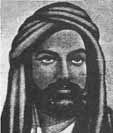
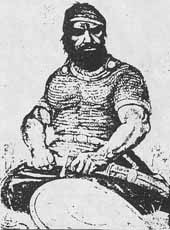
|
Tarikh-e Iran �?��? ���?? , by Dr. Zarinkoob ?������ �?�
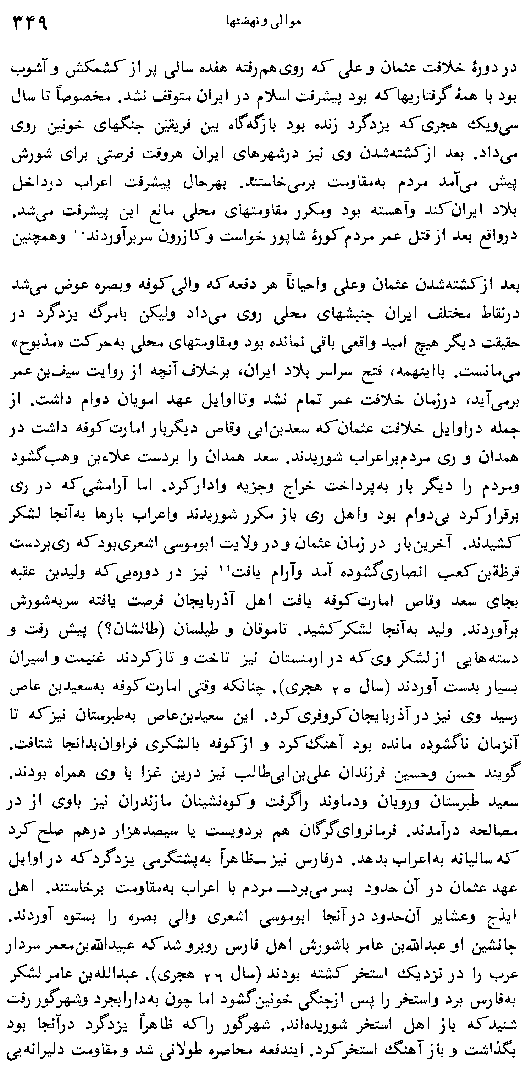

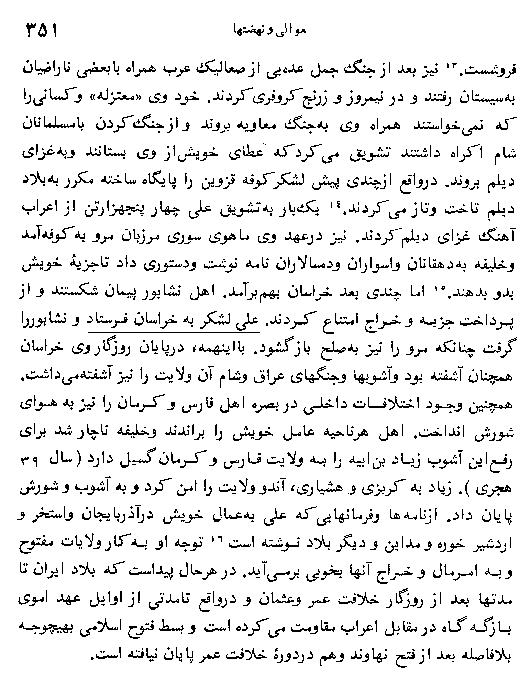

|
This is taken from Nahjoll-balagheh ���?�??��.
PLEASE notice Ali's emphasises on Arab nationality. Islamists want Iranian to beleive that Ali loved Iranian more then Arabs. WHY should
he?? Is there any reason he would love Iranian more then Arabs? He killed any Arab who was against him and Mohammad, why would he HELP
or SAVE Iranian????
We see here that he is wining and dining with that Umar and when his trun comes to be caliph, he do the exact same thing Umar and Usman
did to Iranian.

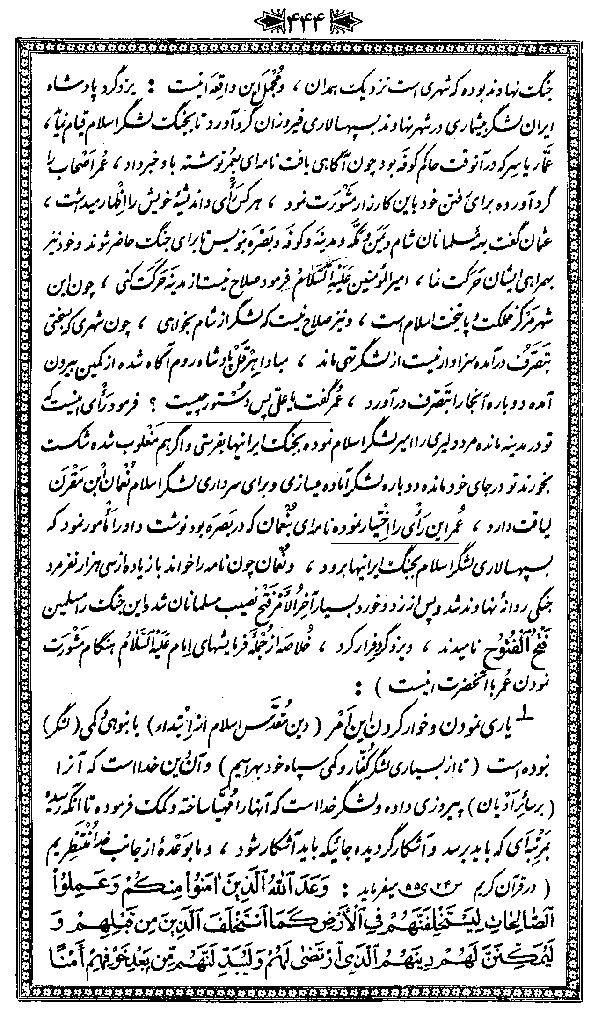
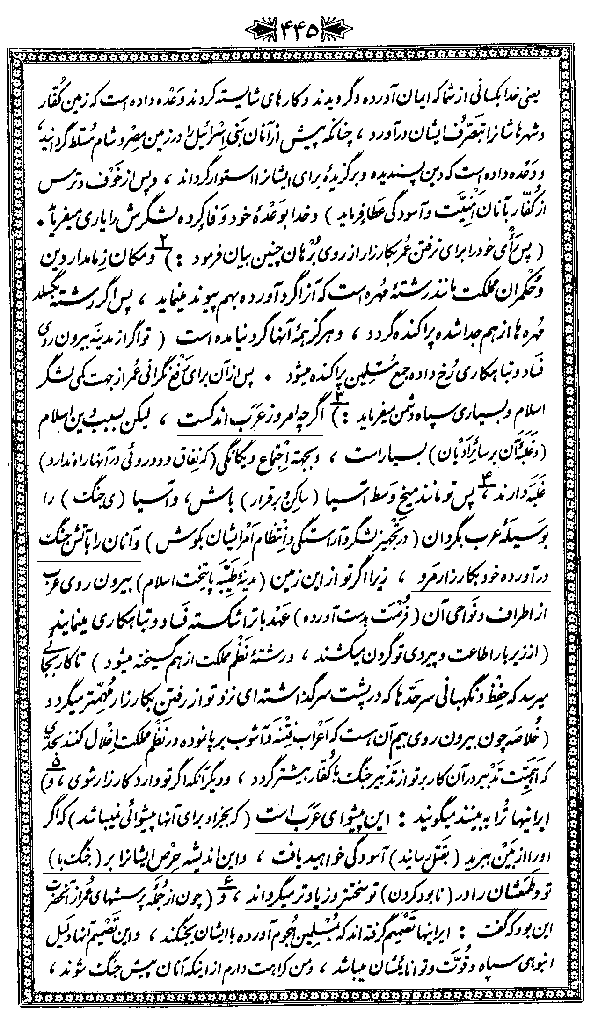
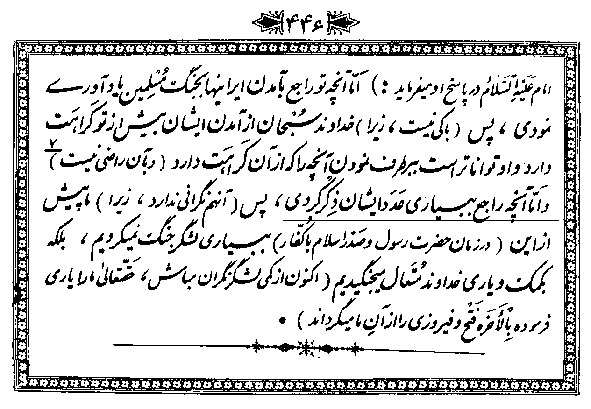
This is the English translation of Ali's advice to Umar. There was apparently two questions for Umar to consider: 1. should Umar
himself lead the army or should he stay behind; 2. should Umar invade Iran. Umar was hesitant to invade becuase Iran possessed larger army.
Ali's advice to Umar was that Umar should invade Iran. That because Allah is with Umar's side and He is not with Iranians, then Umar's
smaller army would win. Finally, Imam Ali advises Umar to stay behind in Mecca, becuase of he was leading the war himself, then the
Iranians would target him and kill him in the battle and it would be bad for the invading Arab side. All this is in Imam Ali's
Nahjolbalagheh and the footnote giving the historical context.
Here is sermon 145 of Imam Ali, Nahjol-balagheh:
SERMON 145
Spoken when `Umar ibn al-Khattab consulted Amir al-mu'minin about taking part in the battle of Persia. (1)
In this matter, victory of defeat is not dependent on the smallness or greatness of forces. It is Allah's religion which He has raised
above all faiths, and His army which He has mobilised and extended, till it has reached the point where it stands now, and has arrived
its present positions. We hold a promise from Allah, and He will fulfil His promise and support His army.
The position of the head of government is that of the thread for beads, as it connects them and keeps them together. If the thread is
broken, they will disperse and be lost, and will never come together again. The Arabs today, even though small in number are big because
of Islam and strong because of unity. You should remain like the axis for them, and rotate the mill (of government) with (the help of) the
Arabs, and be their root. Avoid battle, because if you leave this place the Arabs will attack you from all sides and directions till the
unguarded places left behind by you will become more important than those before you.
If the Persians see you tomorrow they will say, "He is the root (chief) of Arabia. If we do away with him we will be in peace." In this
way this will heighten their eagerness against you and their keenness to aim at you. You say that they have set out to fight against the
Muslims. Well, Allah detests their setting out more than you do, and He is more capable of preventing what He detests. As regards your idea
about their (large) number, in the past we did not fight on the strength of large numbers but we fought on the basis of Allah's support and
assistance.
--------------------------------------------------------------------------------
(1). When some people advised Caliph `Umar to partake in the battle of al-Qadisiyyah or Nahawand, he finding it against his personal
inclination, thought it necessary to consult Amir al-mu'minin, so that if he advised against it he would plead before others that he had
stayed back on Amir al-mu'minin's advice, but also if he advised partaking in the battle some other excuse would be found. However, unlike
others, Amir al-mu'minin advised him to stay back. The other people had advised him to join in fighting, because the Holy Prophet did not
send only others to fight but took part in it himself as well, keeping his close relations also with him. What Amir al-mu'minin had in view
was that `Umar's presence in the battle could not be beneficial to Islam, but rather his staying back would save the Muslims from dispersion.
Amir al-mu'minin's view that "the position of the head of government is that of the axis around which the system of the government rotates"
is a point of principle and does not concern any particular personality. Whether the ruler is a Muslim or an unbeliever, just or despotic,
virtuous or vicious, for the administration of the state his presence is a necessity, as Amir al-mu'minin has explained elsewhere at greater
length:
The fact is that there is no escape for men from a ruler good or bad. Faithful persons perform (good) acts in his rule while the unfaithful
enjoys (worldly) benefits in it. During the rule, Allah will carry everything to its end. Through the ruler tax is collected, the enemy is
fought, roads are protected and the right of the weak is taken from the strong till the virtuous enjoy peace and are allowed protection from
(the oppression of) the wicked. (Sermon 40) The words which Amir al-mu'minin uttered in his advice are not indicative of any quality of
Caliph `Umar except his being the ruler. There is no doubt that he held worldly authority, irrespective of the question of whether it was
secured in the right way or wrong way. And where there is authority there is centring of people's affairs. That is why Amir al-mu'minin said
that if `Umar would go out the Arabs would follow him in large numbers towards the battlefield, because when the ruler is on the march the
people will not like to stay behind. The result of their going would be that city after city would become vacant, while the enemy will infer
from their reaching the battlefield that the Islamic cities are lying vacant, and that if these people were repulsed no assistance would
reach the Muslims from the centre. Again, if the ruler were killed the army would disperse automatically, because the ruler is as its
foundation. When the foundation is shaken the walls cannot remain standing. The word "aslu'l-`Arab" (the root chief) of Arabia has not been
used by Amir al-mu'minin as his own but he has taken it from the Persians. Obviously in his capacity as the head of the State, Caliph `Umar
was, in their view, the chief of Arabia. Besides, the reference is to the country, not to Islam or Muslims, so that there is no suggestion
of any importance for him from the Islamic point of view.
When Amir al-mu'minin pointed out to Caliph `Umar that on his reaching there the Persians would aim at him, and that if he fell into their
hands they would not spare him without killing, although such words would have touched the brave to the quick and would have heightened
their spirits, `Umar liked the advice to stay back and thought it better to keep himself away from the flames of battle. If this advice had
not been in accord with his personal inclination he would not have received it so heartily and would have tried to argue that the administration
of the country could be maintained by leaving a deputy. Again when other people had already advised him to go out, what was the need for
consulting Amir al-mu'minin except to get an excuse to stay back.
|
Here is another letter of Ali to his head of army in Persia. As you see, he is only concern about the money, "kharraj".

[ The following is a letter from Imam Ali (a) to Ziyad who was appointed as the Commissioner of Basra by Abdullah bin Abbas, the
Governor of the provinces of Ahwaz, Basra, Kirman and Fars. Ziyad was from the very beginning dishonest and corrupt, a man who would
not stop short at any vice or sin to gain his end. He had come from a very low family so much so that nobody knew his father's name; his
mother was a harlot. Ummul Mu'minin Aisha had nicknamed him as "His father's son" and he was known all over Arabia by this insulting name.
But he was a self-made man, a great conspirator. Ibn Abbas had found him a useful officer as he could suppress any voice raised against his
government. He appointed him as a commissioner and had recommended him to Imam Ali (a). Imam Ali (a) also gave him a chance and wanted to
see whether he could give up his bad ways. But he did not change his behaviour, so Imam Ali (a) dismissed him.
Later on Mu'awiya in his court declared him to be his father's (Abu Sufyaan's) illegitimate son. Ziyad was glad that atleast he could name
some big man - though thirty years after the death of that man - to be his father, and thus became a staunch friend of Mu'awiya - his
so-called half brother. Imam Ali (a) wrote this letter to Ziyad when he was still the Commissioner of Basra. ]
I swear by Allah that if I find you misappropriating the wealth of Muslims I will punish you in such a way that you will be left poor.
Besides this poverty there will be the burden of sins on your shoulders, you will be disgraced and humiliated, losing your position and
prestige.
|
This is an excerpt from "Tarikh-e dah hezar sale Iran" �?��? ��?��?�� �� ���??
by Abdol-Azim Rezai ��?�� �����?�?�, where he talks about the aftermath of Ghadesiyeh
����?� and the fact that Ali received one part of the magnificent Baharestan carpet
as his share of booty. Arthur Christensen, the Danish historian also conforms that fact. Baharestan carpet was cut into
pieces and there is many evidence that suggest that Ali himslef has ordered that.
From what we know from Nahjol-balaghe, his consultation with Umar took place right before, Ghadesieh, so it is not too carzy to assume that
Ali was present at MadAeen, since he was one of Arabs best soliders, futhermore according to Quran, no one get any share of any booty if he
dose not engage in the bettle(al-Hashr 59:5, 6) himself. That was the norm back then.

|
From Fotoh-al-baldAn �?��?�??�?� (the part about Iran) by BalAzari ����?
This is again evidence of Ali's controll over his governors. It seems that Ali appoint, Yazid Ibn AkkAbe to be governor of
Ray and Dastbi. Yazid steals money and Ali puts him in jail. Well that seem to be the pattern here, Ali is taking care of
business, Money.

Again, this proves that Ali sent troops to Daylaman to fight people.
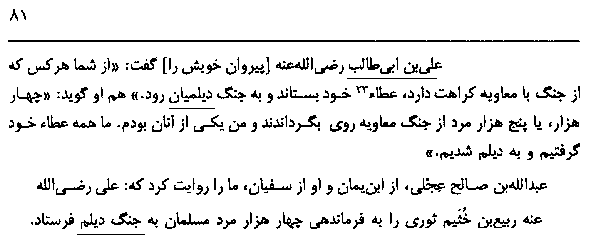
|
It is so horrifing when you read the history and find out more about what our ancestors endured after Iran was
invaded by Tazis. You certainly can feel their pain and anguish.
Here you have another example of Ali's atrocity towards our ancestors. As you read and discover here, Iranian were not only
subject to violence from the Tazi caliphs but they were also brutalised by the lawless gangs of Tazis.
Here you have an example of such atrocity, please notice that we DO NOT include the abuse from other caliphs and other Tazis
here in this article, these are ONLY Ali's crimes.
This time people of Sisstan are subject to Tazi violence or shall we say "sublim teaching of Islam", first this two criminals,
Hasake Habati and Ibn Fasil attack the city of ZAlegh and steal everything and then they attack the city of Zerang and force
people to surrender. At the end Ali sends 4000 troops to Sisstan and take care of both the lawless Tazi gang and the
rebellious Iranian.
From Fotoh-al-baldAn �?��?�??�?� (the part about Iran) by BalAzari ����?
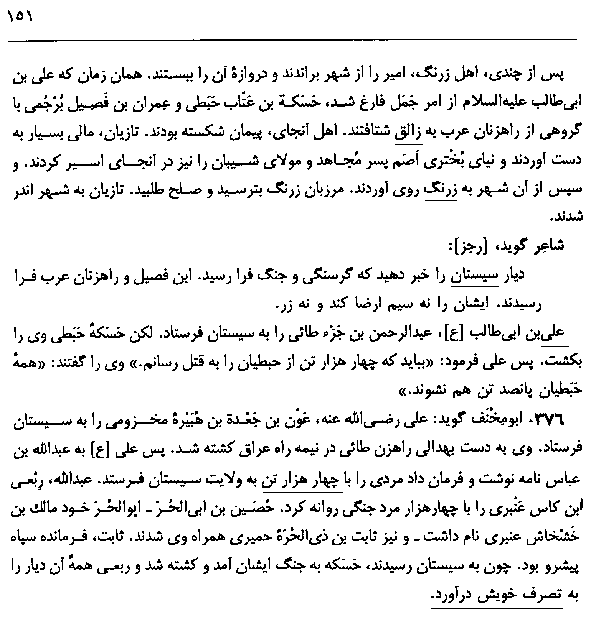
|
So far we have seen crimes and savagary commited by Ali in Azarbaiyjan, Sisstan, Fars, Estakhr, Daylaman, Ghazvin, Rey
and Hamadan. Now its Khorasan, as you see here, he sent troops many times to Khorasan. Although he was not always successful
but he tried like any other Tazi would try.
The point to notice here is the fact that, during and after his leadership, there were upraising and revolt in Khorasan along
with other parts of Iran. Even when he got killed, Khorasan was in middle of a big revolt.
These FACTS prove that, people of Iran did NOT have any special feeling towards Ali and Ali did not feel any special love for
Iranian. When he was alive and in power, Iranian didnt like him, so what happend that made Iranian to fall in love with
him, after his dead??? This is indeed what both ignorant and charlatan islamist claim, that Ali loved Iranian and Iranian
loved him. Where is it??????
Infact Iranian displyed the same disgust towards him as they showed towards Umar.
From Fotoh-al-baldAn �?��?�??�?� (the part about Iran) by BalAzari ����?
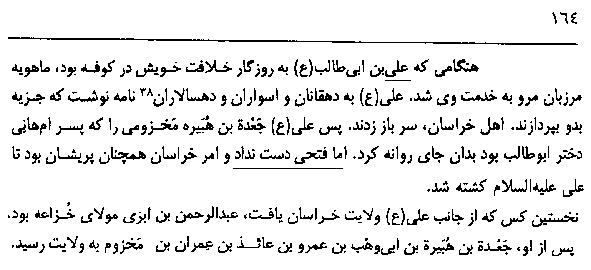
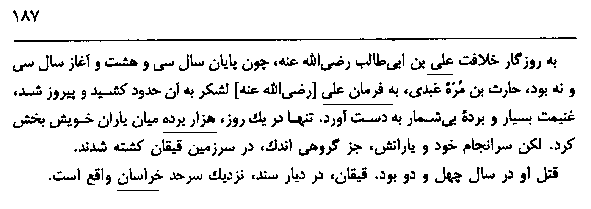
|
This, we've already seen and know about, the participation of Hassan and Hossien in massacre which took place in
Tabarestan. Read more detail about that massacre,
..... ���? � ��? ?��? �?��?��? �??��

Umar consulting Ali again about the affairs of his leadership. As you see here, these Tazis stood close to each other and shared the decision making and the wealth accumulated by their thievish activities.
From Fotoh-al-baldAn �?��?�??�?� (the part about Iran) by BalAzari ����?

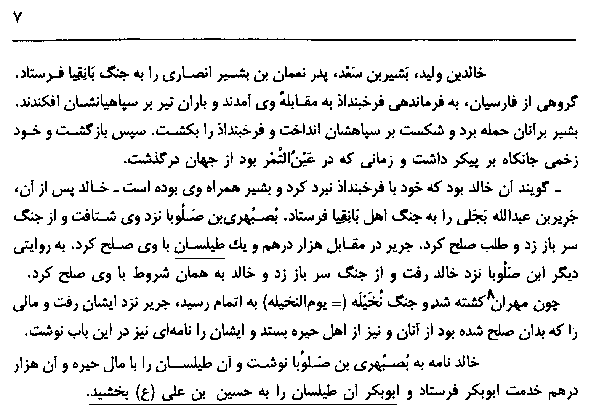
These are conformation from other reliable sources on events already been mentioned.


Its imperative to notice that, these FACTS are all only Ali's atrocities and NOT all what Tazis did. Books have
been written to describe the horror and svagary Tazis inflicted upon Iranian.
|
Home Page
|
|
|